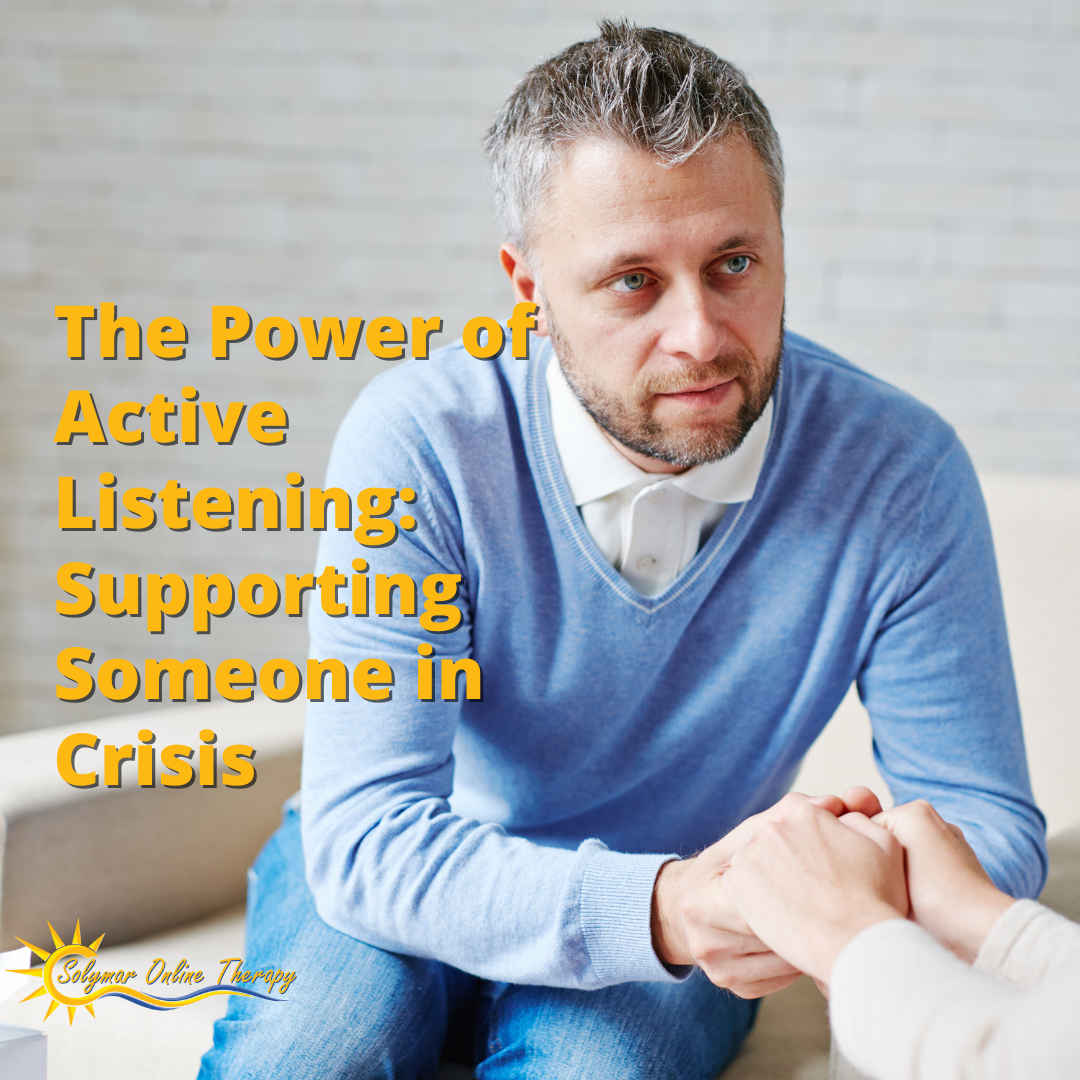 Introduction
Introduction
In times of crisis, the power of active listening can be transformative. When someone is struggling with their mental health or going through a difficult time, having someone who genuinely listens and empathizes can make a significant difference. Active listening is not just about hearing words; it is about being fully present, understanding, and offering support without judgment. In this article, we will guide readers on how to practice active listening when someone is in crisis, encourage empathy and understanding, and offer suggestions on how to respond to someone who opens up about their struggles and connect them with professional help.
The Art of Active Listening
Active listening is a skill that requires genuine interest, patience, and compassion. Here's how you can become an active listener when someone is in crisis:
-
Be Present: Give your full attention to the person speaking. Put aside distractions and focus on the conversation.
-
Maintain Eye Contact: Eye contact shows that you are engaged and actively listening to what the person is saying.
-
Show Empathy: Try to put yourself in their shoes and understand their feelings and emotions without judgment.
-
Ask Open-Ended Questions: Encourage the person to share more by asking open-ended questions that allow them to express themselves freely.
-
Reflect and Validate: Reflect on what the person is saying and validate their feelings. Show understanding and avoid dismissing their emotions.
-
Avoid Interruptions: Allow the person to speak without interrupting. Interrupting can make them feel unheard or dismissed.
Responding to Someone in Crisis
-
Stay Calm: It is essential to remain calm and composed when someone opens up about their struggles. Your calm demeanor can provide comfort and stability.
-
Listen without Judgment: Create a non-judgmental space where the person feels safe to share their thoughts and feelings.
-
Express Empathy: Let the person know that you understand their feelings and that it's okay to feel the way they do.
-
Avoid Offering Immediate Solutions: Avoid jumping to offer solutions right away. Sometimes, the person needs to be heard and validated before seeking solutions.
-
Acknowledge Their Courage: Acknowledge their courage in sharing their feelings and concerns with you. Let them know that you are there to support them.
-
Avoid Minimizing Their Feelings: Never trivialize or minimize their emotions. Show genuine concern and validation for their experiences.
Connecting with Professional Help
While active listening is a powerful support tool, it is essential to recognize the limits of informal support. Encourage the person to seek professional help when needed:
-
Normalize Professional Help: Assure the person that seeking professional help is a positive step toward healing and well-being.
-
Offer Information: Provide information on mental health resources and local helplines that they can reach out to for support.
-
Accompany Them: Offer to accompany the person to their first appointment with a mental health professional to provide emotional support.
-
Follow Up: Check in on their well-being and offer ongoing support. Remind them that professional help is available whenever they are ready.
-
Recognize Crisis Warning Signs: Be aware of warning signs that indicate the need for immediate professional intervention, such as expressing a desire to end their life or giving away possessions.
The Impact of Active Listening
Active listening can have a profound impact on someone in crisis. By providing a safe and empathetic space for them to share their thoughts and emotions, you can help them feel validated, supported, and less alone in their struggles. Active listening promotes emotional well-being and can be a catalyst for seeking further help.
It is important to remember that while active listening is valuable, it is not a substitute for professional help. If someone is in immediate danger or experiencing a mental health crisis, do not hesitate to contact emergency services or helplines for immediate assistance.
Conclusion
Active listening is a powerful tool in supporting someone in crisis. By being fully present, showing empathy, and offering non-judgmental support, you can make a significant difference in someone's life during challenging times. Encourage them to seek professional help when needed, and let them know that you are there to support them on their journey to healing and well-being.
Remember, supporting someone in crisis is not about having all the answers; it's about being there to listen, understand, and connect them with the appropriate resources when necessary.
Hashtags: #ActiveListening #SupportInCrisis #MentalHealthSupport #EmpathyandUnderstanding #PowerofListening #CrisisIntervention #NonjudgmentalSupport #SeekingProfessionalHelp #MentalWellBeing #SupportiveConversation
Suicide Help
Suicide Help Lines
![UK Suicide Help Lines]() UK
UK
Here are some UK-based helpline numbers and resources that individuals can reach out to for immediate support if needed:
-
Samaritans Helpline: 116 123 Website: www.samaritans.org
-
Mind Infoline Helpline: 0300 123 3393 Text: 86463 Website: www.mind.org.uk
-
CALM (Campaign Against Living Miserably) Helpline: 0800 58 58 58 Website: www.thecalmzone.net
-
PAPYRUS (Prevention of Young Suicide) Helpline (for under 35): 0800 068 41 41 Website: www.papyrus-uk.org
-
The Mix (for under 25) Helpline: 0808 808 4994 Website: www.themix.org.uk
-
Rethink Mental Illness Helpline: 0808 801 0707 Website: www.rethink.org
-
YoungMinds (for parents concerned about their child's mental health) Helpline: 0808 802 5544 Website: www.youngminds.org.uk
-
Childline Helpline: 0800 1111 Website: www.childline.org.uk
Remember, if you or someone you know is in immediate danger or requires urgent medical attention, please call 999 or go to the nearest hospital emergency department.
These helplines and resources are staffed by trained professionals who can provide confidential support, guidance, and a listening ear to those experiencing emotional distress, including thoughts of suicide. It's crucial to reach out for help when needed, and these organizations are there to offer support 24/7.
![Canada Suicide Help Lines]() CANADA
CANADA
Here are some Canadian-based helpline numbers and resources that individuals can reach out to for immediate support if needed:
-
Canada Suicide Prevention Service Helpline: 1-833-456-4566 Website: www.crisisservicescanada.ca
-
Crisis Text Line Canada Text: CONNECT to 686868
-
Kids Help Phone (for youth under 20) Helpline: 1-800-668-6868 Website: www.kidshelpphone.ca
-
First Nations and Inuit Hope for Wellness Help Line Helpline: 1-855-242-3310
-
Trans Lifeline Helpline: 1-877-330-6366 Website: www.translifeline.org
-
Canadian Mental Health Association (CMHA) Crisis Line Check your local CMHA branch for the helpline number.
-
Crisis Services Canada Helpline: 1-833-456-4566 Text: 45645
-
Distress Centres of Greater Toronto Helpline: 416-408-4357 Text: 45645
These helplines and resources provide confidential support and assistance to individuals in Canada who may be experiencing emotional distress, suicidal thoughts, or other mental health challenges. Trained professionals are available to offer help 24/7, ensuring that those in need have access to immediate support and someone to talk to during difficult times.
As with any crisis situation, if you or someone you know is in immediate danger or requires urgent medical attention, please call 911 or go to the nearest hospital emergency department.
![US Suicide Help Lines]() USA
USA
Here are some USA-based helpline numbers and resources that individuals can reach out to for immediate support if needed:
-
National Suicide Prevention Lifeline Helpline: 1-800-273-TALK (1-800-273-8255) Website: www.suicidepreventionlifeline.org
-
Crisis Text Line Text: HOME to 741741 Website: www.crisistextline.org
-
Veterans Crisis Line Helpline: 1-800-273-TALK (1-800-273-8255), press 1 Text: 838255 Website: www.veteranscrisisline.net
-
SAMHSA (Substance Abuse and Mental Health Services Administration) National Helpline Helpline: 1-800-662-HELP (1-800-662-4357) Website: www.samhsa.gov/find-help/national-helpline
-
National Alliance on Mental Illness (NAMI) Helpline Helpline: 1-800-950-NAMI (1-800-950-6264) Website: www.nami.org
-
TrevorLifeline (for LGBTQ+ youth) Helpline: 1-866-488-7386 Website: www.thetrevorproject.org
-
RAINN (Rape, Abuse & Incest National Network) National Sexual Assault Hotline Helpline: 1-800-656-HOPE (1-800-656-4673) Website: www.rainn.org
-
National Domestic Violence Hotline Helpline: 1-800-799-SAFE (1-800-799-7233) Website: www.thehotline.org
These helplines and resources offer confidential support and help to individuals in the USA who may be experiencing emotional distress, suicidal thoughts, or dealing with mental health and related issues. Trained professionals are available 24/7 to provide immediate assistance and a listening ear for those in need.
In case of a life-threatening emergency or immediate danger, please call 911 or go to the nearest hospital emergency room for immediate help.

 UK
UK CANADA
CANADA USA
USA




